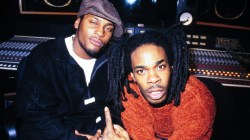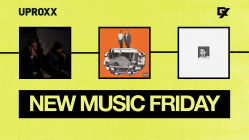Radio never sounds as refreshing as it does when you’re driving out of Central New Jersey, after being stuck between the stations of New York and Philadelphia. My coworker Omar and I were making the latenight hike back to the City of Brotherly Love after a long week of Manhattan label meetings. Nothing new: advertising dollars and quality down, digital popcorn music quantity up. We played every dismal promo we’d received in the course of that half hour stretch without an FM signal. When the static broke, we heard Cosmic Kev on Power99 cut into Slim Thug‘s “I Run” [click to listen] for the first time. I had no idea then, but this three minutes and 56 seconds may have changed a whole, dirt-nap decade for the label who put the record out.
As a Rap fan, when Koch Records switched their name to E1 Entertainment, it was the equivalent of KFC‘s recent “Kentucky Grilled Chicken” campaign – a Crisco smear on a speckled past. It seemed like an attempt to divorce the past stigmas of the label. If anything, I was angry that the label gave Jim Jones [click to read] an executive title and a seemingly no-show job (conspiculously, at the same time, a few good men were let go). I had no idea that really and truly, E1 was refreshing the Koch formula and arguably challenging its Big Four peers.
Let’s be honest, when 50 Cent [click to read] called Koch Records a “graveyard” in that epic radio riptide with Cam’ron [click to read], he had a point. Yesteryear’s star rapper flocked to the “major independent.” Despite boasting a roster that included D-Block [click to read], The Diplomats, Xzibit [click to read], Snoop Dogg [click to read] and Three 6 Mafia [click to read], and occasional chart success, few can ever really say that Koch made meaningful music in the latter half of this decade. The label’s distribution was strong and the reported contracts were innovatively artist-friendly, but one thing Koch lacked was critical acclaim, or a real A&R department. If the decade-old label was indeed a graveyard, it was simply because its artists (with two exceptions: DJ Khaled [click to read] and Jim Jones) were buried six feet deep on the charts, never to return to the mainstream consciousness.
Then again, how quickly we forget Koch’s roots. Personally, I can recall the first time I purchased a CD from the then-Manhattan-based label. It was 2001, and KRS-One [click to read] had severed ties with Jive and reportedly botched an executive imprint deal at Capitol. Tha Teacha reappeared on this new label, boasting an album called The Sneak Attack. That was, of course, when lack of marketing could be strategic; KRS, from title-to-album-cover, planned to surprise the industry. With production from Pete Rock [click to read] and Domingo, it was a supposed continuation to Kris’ career best-selling, 1997 gem I Got Next! The label on the back of the album didn’t matter, nor were any of us in Hip Hop thinking any less of him for fighting off the Man to get his product out on the fledging indie. Even though “Hot” did not translate as a radio single, the album premiered in the Top 50 of Billboard’s charts, in what I consider the last successful year for underground Hip Hop.
Koch followed up. They liberated Kool G Rap’s [click to read] Giancana Story [click to read] from the fumbling Rawkus Records. Although the relocated album was stripped of classic singles like “First Nigga,” the buzz eclipsed the 1998 self-released (but still seminal) Roots Of Evil. Koch had taken in another ’80s Rap veteran. While Rawkus had reportedly tried to put the Juice Crew stalwart in the studio with Chad and Pharrell [click to read], Koch‘s laissez-faire A&R department allowed for Kool G Rap to call his own shots, working with Buckwild, Mike Herron and Dr. Butcha.
Despite missing the Top 200 with your favorite rapper’s favorite lisped rapper, Koch stayed the course in 2002. The label that was helping rappers find new homes for their masters acquired Royce Da 5’9” [click to read] from Columbia. Although the “2.0” in Rock City [click to read] may’ve been a nice way of saying “too late,” anybody that heard his seamless split between honesty and cocky lyricism could appreciate the album. That and 2004’s Death Is Certain [click to read] remain two of the crown jewels in Royce’s catalog, so it comes as little surprise that he’s back seven years later, putting his Slaughterhouse material out with the same people that believed in what Tommy Boy and Columbia did not.
The rescue patrol continued. With its Fast Life subsidiary, Koch believed in Hip Hop while the Midtown majors moved on. Although the quality of Koch music was subsequently compromised, artists like AZ [click to read] and Prodigy [click to read] made music very comparable to their big budget pasts. AZ in particular, delivered intricately lyrical releases in A.W.O.L. [click to read] and The Format [click to read]. Both paired the Brooklyn vet with production from DJ Premier and the likes, a direction no longer afforded to major label brother Nas. Fast Life helped Little Brother get a short-lived deal with Atlantic, and they helped M.O.P. prove they were better at being Metal rockers than being stranded on G-Unit or Roc-A-Fella. Koch also helped jump-start the renaissance enjoyed by Duck Down, as few can deny that Black Moon‘s Total Eclipse was not a forceful take-back of New York Rap. As with AZ, Prodigy and Mash Out, Black Moon used Koch‘s muscle and reach to tell the world how to “Stay Real.”
The glory ended there. As their roster grew, Koch abandoned their strategy of never comprising artist integrity for sales. The imprint reportedly began giving artists $7 a record at a time when a Def Jam deal was generous at a quarter. Without marketing and promotions, Koch could afford to pay artists incredible royalty splits in hopes that the artist’s name alone would sell the album. Music just happened to be on the CD. Not yet a graveyard, Koch became a consignment shop. 2004 marks the same year that Koch signed No Limit, Death Row and The Diplomats.
By the time Koch backed them, No Limit had fatally lost the competitve war with Cash Money Records. Coming out of his teens, Lil Wayne [click to read] began experimenting with Carter lyricism at a time when “boy, toy, gun, son, fo’ty, whodi” rhymes were the norm. With Wayne‘s growth and Mannie Fresh‘s hit-making, what good was Master P and his dwindling roster? If anything, the legal woes of Mystikal, Mac and C-Murder [click to read] were one of the rare cases in Hip Hop where keeping it real went wrong. Koch took on No Limit‘s distribution after Universal failed to match Priority‘s success. The indie simply looked like J.R. Rotem and Britney Spears’ relationship: the guy dating the trophy, after the guy, after the guy.
Having first loved Hip Hop through my affinity for Dr. Dre production and Can-Am Studio session recordings, I’ve always held an Otis Spunkmeyer softbaked spot for Tha Row. So you can imagine how disappointed I was when Koch‘s failure to re-launch happened again with their Death Row partnership. Koch was the fourth Death Row distributor since the controversial label left Interscope. They also dropped the label’s only new music since 2000: Kurupt‘s [click to read] Against Tha Grain. Even with guidance from the esteemed Sir Jinx [click to read], this 2005 album appeared as if it was conceptualized over a six-pack, and recorded over a weekend. Death Row and the Koch graveyard were rightfully synonymous.
Back east, The Diplomats‘ brand had been patient throughout Cam’ron’s second and third albums. Admittedly, Jim Jones’ On My Way To Church [click to read] debut marks one of the pinnacles of Heatmakerz/chipmunk Soul production, but the album was poorly tailgated by two terribly lackluster Dipset compilations and a swarm of weed-carrier mixtapes-with-barcodes. By now, Koch had fully morphed from true-school Hip Hop’s safe harbor into a place where you could get your mans signed and catch a few album points in doing so. In the next three years, Fat Joe [click to read], Slim Thug [click to read], Tha Dogg Pound and Scarface [click to read] would all drop product at Koch with their names on the covers. They would all then try to sustain major label deals and act like the Koch albums were strewn-together side projects.
While I’ve always thought that Koch had a far more amicable and professional staff than many of the majors, I can’t say too many of their releases have excited me in the last five years. Slim Thug and Boss Hoggz‘ first Serve & Collect [click to read] had some banging beats, though absent of nearly everything else. Joell Ortiz‘s [click to read] debut The Brick [click to read] was a reintroduction to Rap storytelling, but was cheapened by the sense that his Aftermath album was his debut, and this was just something to check chart temperature. Few albums ever thwarted my anticipation as much as Skillz‘ [click to read] empty Million Dollar Backpack [click to read]. Koch may have been making money, but they were not making history.
As 2009 yielded vanity albums from Skull Gang, K.A.R. [click to read] and Havoc [click to read], I just chalked up my apathy towards Koch releases to being in this game too long, and being a dinosaur in the digital age. Then came that night I heard “I Run” on the New Jersey Turnpike. The fuzzed out beat, the guilty pleasure ’80s chorus, and Thugga‘s cocksure vocals: E1 was again making music that I wanted the car next to me at the red light to hear. Slim Thug‘s music actually sounded better for being at Koch. He hadn’t lost a step, and instead of just trying to get a check, his catalogue was being upgraded. It was the same way I had felt when I first heard the opening 30 seconds to “We Fly High,” until Jim started rapping.
By summer, I’m starting to feel like it’s 2001 all over again. This afternoon, I just bought my third copy of Wu-Tang Clan‘s Chamber Music [click to read], which I can’t stop giving to friends as a gift. With Lil Fame behind the boards with RZA [click to read], the Hip Hop collaborative spirit is alive again. Opening up the booth to Masta Ace [click to read], Sean Price [click to read] and AZ (along with stellar Ghostface, Inspectah Deck [click to read] and Raekwon [click to read] verses), this release does more for me than anything carrying the Wu emblem since Supreme Clientele.
If my awakenings aren’t convincing, Slaughterhouse [click to read] should be a fire-alarm to the Hip Hop eardrum. The Koch rescue boat is back in the water. Of the four emcees – two reconnecting with the label, this is a project that the majors wouldn’t touch. Instead, the imprint gave carte blanche to the best lineup of lyricists since D.I.T.C. [click to read] and allocated videos, advertising and the belief that they could conquer the charts. Slaughterhouse ignites Hip Hop in one of its darkest moments. Whether it’s condoning a 48 bar verse, or the lack of a chorus, this is the same “doowutchyalike” formula we saw from Koch almost a decade ago with Kris and G Rap. With the Internet soldiers out there, and major label blunders left and right, this time it might really have impact.
Koch is looking at us, the Hip Hop consumer, to see if we’ll put our money where our iPods and Tweets are. If the charts agree with that, there’s no telling which artists will be signed and what projects will be greenlit. I’m personally suggesting Saigon‘s [click to read] The Greatest Story Never Told, Bishop Lamont‘s [click to read] Reformation and Cormega‘s Urban Legend. But of course, I’m way ahead of myself.
If you bring flowers to the Koch graveyard in 2009, you may be disappointed. The junkyard, the graveyard, the holding tank has vanished. Instead, for the first time since their well-intentioned beginnings, Koch is making music with the hopes of it lasting and actually being good. Radio and video might treat E1 like the Tampa Bay Devil Rays of Rap, but that’s because radio and video might be the next to take up those empty graves. As Hip Hop fans have bemoaned labels and CD prices for five years, no label seems to be more reactive to our cries, as opposed to others telling us what market research says we’ll like.
The grimy Pittsburgh club my friends and I used to sneak into to hear Hip Hop is now a posh lounge. The last two true Philadelphia Hip Hop record stores closed their doors in 2008. The deejay whose turntables I used to borrow works on Wall Street now. As I look for my stake in Hip Hop, I want some things to stay. The label we all laughed at seems like the only entity in this culture that’s willing to keep some emcees’ microphones on, giving me the renewed sense that when I walk into the record store, my dollars matter. After all, collectively, we pulled this one up from the underground together.









